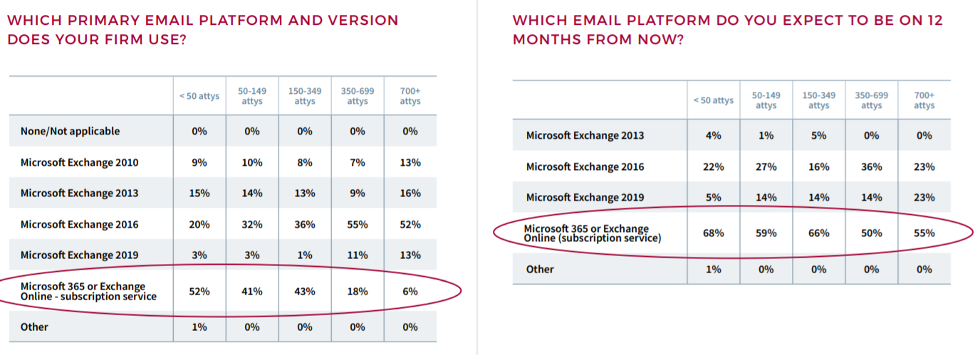The legal industry “moved 10 years into the future in 10 weeks” due to the pandemic.
We thank Sharon D. Nelson, Esq. and John W. Simek at Sensei Enterprises, Inc. for this helpful guest post!
. . .
The Future: By the Numbers
In October 2020, Clio’s Legal Trends Report was officially released in conjunction with the Clio Cloud Conference 2020. As Clio CEO Jack Newton said in an interview with author Nelson, after the pandemic hit, we moved ten years into the future in 10 weeks. What alternative did we have? None.
How are lawyers planning to change their ways? Take a look at these stats:
- 96% say they’ll store firm data in the cloud.
- 95% say they’ll support electronic documents and signatures.
- 96% say they’ll accept electronic payments.
- 96% say they’ll use practice management software.
- 83% say they’ll meet clients through videoconferencing.
To show you how much change there has been, in planning and implementation, here’s how lawyers are operating during the pandemic:
- 85% of law firms are using software to manage their practice.
- 79% of lawyers rely on cloud technology to store their firm’s data.
- 62% of firms allow clients to securely share and sign documents electronically.
- 73% of firms allow clients to pay invoices electronically.
- 83% of firms are meeting with clients virtually.
As you can see, they are doing better with technology now and plan to do MUCH better in the future. Clients and lawyers are also converging on a consensus – that brick and mortar offices are not very important. More than half of consumers believe that most legal matters can be handled remotely.
Before the pandemic, 21% of law firms were operating without commercial office space. Since the pandemic, another 7% of lawyers have given up their commercial offices and 12% are unsure they’ll keep them in the future.
The larger firms will no doubt keep offices but may scale them back – and certainly reconfigure them.
You can read the full Clio Legal Trends 2020 report here.
By the way, knocking off the commute to the office often gave lawyers, especially in large, urban-based firms, an extra two hours in their day.
Interview with Clio CEO Jack Newton
Few people have given as much thought to the future of law practice as Jack Newton. As noted above, he gave an interview to author Nelson at Clio Cloud Conference 2020, where he was happily surprised by having over 4500 attendees, more than double the 2000 attendees at last year’s in-person conference.
Jack noted that there has been a “Teutonic shift” in the legal profession. Suddenly, lawyers who wanted to practice law the way they always had were embracing technology on all fronts. As Jack commented, there will be winners and losers in this process. There are lawyers who are still waiting for the pandemic to blow over, thinking they can return to the past. But this is not a blip on the radar. Perhaps not all changes are permanent, but many of them are. On that, the vast majority of lawyers are agreed.
Clio announced many integrations at the conference, including integrations with Google My Business, HelloSign, Zoom, Microsoft Teams and more.
Jack commented that no one “can do it alone” and that integrations are key to solving the problems that clients have. Why reinvent the wheel yourself when someone else already has? The answer is to integrate your work with theirs. We suspect the legal profession will see many more integrations.
Notable as well is the new Sign in with Clio feature, which will allow Clio users to log-in to integrated third-party applications using the same credentials used for Clio Manage and Clio Grow. This is launching initially for Clio’s integration partners Fastcase, Legalboards, myFirmData, WiseTime and LawYaw, but Clio plans eventually to extend it to all of its more than 200 integrations.
No matter what software a lawyer uses, they are likely to see a lot more integrations in the coming years.
Jack stated that the unifying theme of the conference was that the future of law is client-centric and cloud based. Both have been themes that Jack has underscored for a long time. Lawyers may benefit from reading and then thinking about the concepts contained in Jack’s recent book The Client-Centered Law Firm.
Two important points from that interview:
What clients want and what lawyers want is beginning to converge – both want to work remotely and collaborate digitally.
Law firms must now be cloud-based. Or, as Jack puts it, “The cloud has become table stakes.” Minus the cloud, you’re no longer in the game.
Cybersecurity Evolves Quickly After March 2020
Though the entire ABA 2020 Legal Technology Survey Report is out, first up online were the stats related to Technology Basics and Security. Respondents were asked a total of 262 questions, with 21 questions focused on security. The attorneys who responded were in private practice and here is the breakdown of participants: solos (26%); firms of 2-9 attorneys (30%); firms of 10-49 attorneys (17%); firms of 50-99 attorneys (5%); firms of 100-499 attorneys (10%), and firms of 500+ attorneys (12%).
The answers came in between March and May 2020 so they do reflect the initial impacts of COVID-19, particularly the work-from-home movement.
43% of respondents use file encryption, 39% use email encryption, 26% use whole/full disk encryption. Other security tools used by less than 50% of respondents are two-factor authentication (39%), intrusion prevention (29%), intrusion detection (29%), remote device management and wiping (28%), device recovery (27%), web filtering (26%), employee monitoring (23%), and biometric login (12%). By in large, this indicates that lawyers are not taking cybersecurity as seriously as they should be, though the recent surge of ransomware will no doubt change those statistics next year.
How are firms doing with cyber insurance? Firms ranging in size from 10-49 attorneys are most likely to have cyber liability insurance (40%), followed by firms of 100+ attorneys (38%). One notable trend is the increase in the number of smaller firms with such coverage, with firms of 2-9 attorneys (36%) and solo attorneys (33%) up respectively from 27% and 19% since 2017. We are happy to see those numbers but they also reflect that we still have a long way to go.
As some firms have noted to their chagrin, insurance companies sometimes deny coverage. There are a lot of exclusions and there have been more than a few court battles. Cyber insurance is great and certainly helps fill the risk gap, but it won’t protect you from having to deal with a data breach and you have to be darn sure to understand the coverage you have.
We were not surprised that the new survey shows that 29% of respondents have suffered a data breach (compared to 26% in 2019). We have always thought it likely that this stat is significantly low – in many firms, especially large firms, attorneys may never learn of a breach unless it becomes public.
This is borne out by 21% of respondents reporting that they do not know whether their firm has ever experienced a security breach, with big firms representing the highest percentage of that number at 62% for firms with more than 100 lawyers.
34% of respondents have an incident response plan (IRP), compared to 31% in 2019. Progress there seems very slow to us. Unsurprisingly, 77% of respondents from firms of 100+ attorneys said that their firms had an IRP.
Suggestion for the laggards: Read ABA Formal Opinion 483 – and then start drafting.
Zero Trust Architecture Will Become the Norm
Virtual private networks (VPN) are very standard these days. But they are riddled with vulnerabilities – and subject to a “man in the middle attack.” They have wreaked havoc in 2020 in a work-from-home environment.
Enter zero trust network access (ZTNA).
An October 2020 Forrester study (commissioned by Cloudflare) offered some key findings.
Working from home compelled firms to transform how they operated in the cloud. However, 80% of the IT decision-makers interviewed said their companies were unprepared to make the transformation. Existing IT practices made it difficult to support employee productivity without security compromises.
As a result, 76% of the decision-makers said their firms intend to accelerate their shift to the Zero Trust security framework. More than three-quarters (76%) of decision-makers polled said their companies’ security practices were “antiquated” and needed to shift towards Zero Trust network access.
The report found that 82% of the firms said they were “committed” to migrating to a Zero Trust security architecture. To achieve this goal, close to half (49%) of the firms elevated the role of CISO to board visibility while 39% had a Zero Trust‑oriented pilot for 2020.
The migration towards Zero Trust faces various challenges, with 76% of the firms identifying Identity and Access Management (IAM) as the major challenge.
For those who are unfamiliar with the Zero Trust security model, it allows remote workers to access applications through a secure web-based gateway. The solution implements least-privilege principles and supports multi-factor authentication (MFA) and device security checks. Unlike a VPN infrastructure, Zero Trust is highly scalable, more affordable, and easily integrates with various single sign-on (SSO) platforms already available in the marketplace. It also permits the configuration of access control policies to manage permissions based on users’ privileges and devices.
More than half of all businesses have experienced data breaches (58%) or increased phishing attempts (55%) during COVID-19. Ransomware attacks affected 29% of the respondents.
Infrastructure outages and VPN connection latency issues disconnected 33% and 46% of workers, respectively.
Several vendors offered their services for free or on extended trial periods to allow customers to test their Zero Trust security solutions during COVID-19. The free trial period allowed companies to migrate to a zero trust security model and test advanced security solutions from reputable vendors. They could then select the products that met their security needs and sign up on a permanent basis.
We always knew Zero Trust Network Access was coming, but COVID has accelerated its arrival.
Are Law Firms Downsizing or Rightsizing?
What the heck is rightsizing anyway? Basically, it seems to be a euphemistic word for downsizing. There is no question that law firms are downsizing – the trend has continued since the pandemic erupted. Many layoffs have been dubbed stealth layoffs – people are quietly furloughed and then laid off. Or the layoffs are immediate. We are seeing a lot of that in larger firms, primarily of supporting staff rather than lawyers.
How does the word get out? Often by employees talking to one another, sometimes forwarding the news to media outlets like Above the Law. Sadly, with no end to the pandemic in sight, it may be some time before firms stabilize and revitalize.
Going Cloud is All the Fashion
ILTA’s 2020 Technology Survey was released in September 2020. When respondents were asked, “How would you describe the cloud philosophy at your firm?”, over a third of responses were, “Cloud with every upgrade.” (this trend was fairly even across firm size.) In other words, any upgrade would be done to the cloud. Once again, this determination echoes the thinking of Clio CEO Jack Newton noted above.
50% of firms reported their email was in the cloud or headed there soon – and 37% said the same of their document management software. Time and billing software has been slower to move to the cloud, but it is definitely starting to go there.
Think Microsoft 365 had rapid adoption before the pandemic? Just look at the extraordinary charts below and see how quickly larger firms intend to adopt Microsoft 365.
A lot of firms were not willing to invest in work-from-home technology at the beginning of the pandemic, shortsightedly trying to save money. As they realized how insecure home networks and personal devices were, they began to change their minds.
More and more, we are seeing firms buying more laptops for employees as firm assets, secured by the firm, and with the restriction that only the law firm employee may use the device.
As the survey noted, Zoom was the right technology at the right time, and Zoom’s ability to respond to criticisms of security, usability and lack of features allowed it to make serious in-roads to our collective practices, including courtrooms, presentations, client meetings, and general collaboration. When asked, “Which videoconferencing software does your firm use?,” Zoom usage has doubled (from 34% to 71%). And we would bet that the number would be even higher if the survey were done again today.
Microsoft Teams is being embraced as much for its collaboration features as for its eventual promise (as a multi-faceted tool that could prove to become a firm’s Unified Communications solution.)
Thirty eight percent of firms used DocuSign, up 9 points from last year. Notarization moved to remote notarization processes, using applications like DocVerify. 21% of our firms responded they are using remote online notarization tools.
The Road Forward
As our friend at Microsoft, Ben Schorr, told us: “Hopefully this has given a positive, needed, shove to companies into digital transformation that will pay dividends for them down the road. It may have been unexpected/unplanned, and even uncomfortable right now, but hopefully 18 months from now they’re saying ‘I’m glad we did that, even if I wish it had been under better circumstances.’ ”
We are happy to see law firms discovering – even embracing – the notion that innovating how they practice law can propel them into a successful future. They are taking hard looks at new technology, upgrading their cybersecurity, changing their marketing efforts, planning to permit more remote working even after the pandemic and, most of all, making sure that their firms move toward operating in a client-centric mode.
Final Thoughts: The Times, They Are A-Changing
Our friend Judge Monty Ahalt used to say that we are the only profession that works by looking in the rear-view mirror. Well, that just won’t serve well anymore. We expect some lawyers will conclude that and retire. Some will conclude that and change the way they practice.
And some will believe that this is all just a blip on the radar and stubbornly practice law as they always have.
That way lies extinction.
. . .
Sharon D. Nelson, Esq. is a practicing attorney and the president of Sensei Enterprises, Inc. She is a past president of the Virginia State Bar, the Fairfax Bar Association and the Fairfax Law Foundation. She a co-author of 18 books published by the ABA. snelson@senseient.com.
John W. Simek is vice president of Sensei Enterprises, Inc. He is a Certified Information Systems Security Professional and a nationally known expert in the area of digital forensics. He and Sharon provide legal technology, cybersecurity and digital forensics services from their Fairfax, Virginia firm. jsimek@senseient.com.
© 2020 Sensei Enterprises, Inc. The Future of Law Post-Pandemic: A Roller Coaster Evolution. Sensei Enterprises, Inc., is a legal technology, cybersecurity and digital forensics firm based in Fairfax, VA. 703-359-0700 (phone) www.senseient.com
. . .
Related Reading:
ABA Tech Report 2020: Features reports on Cybersecurity, Cloud Computing, Solo & Small Firm, Websites & Marketing, Technology Training, Practice Management, Litigation & TAR, Budgeting & Planning
2020 State of US Small Law Firms (Thomson Reuters)
The Simple Guide to Legal Innovation (Legal Evolution, January 2020)
Legal Design, Not Legal Tech, Best Enables Access to Justice (Legal Executive Institute, Thomson Reuters, May 2020)
Where Is the Client-Facing Innovation in Law Practice? (ABA Journal, November 2019)
Future Careers: Key Soft Skills, Specializing & Generalizing in the Legal Profession (Mass LOMAP Blog, December 2020)
5 (Unforeseeable, Predicable, And Surprising) Legal Tech Trends In 2020 (Above the Law, December 2020)
Crystal Ball: Our Editorial Board Makes Their Predictions for 2021 (ABA Law Practice Today, December 2020)
What’s on the Horizon for Law Firms in 2021? (Law Practice Tips Blog, December 2020)
Legaltech Journalists Pick the Top Stories of 2020 (Law Practice Tips Blog, December 2020)
The Most Popular LawNext Podcasts of 2020 (LawSites Blog, December 2020)
8 Legal Practice Areas Growing in 2021 and Beyond (Attorneyatwork.com, January 2021)
Related Resources:
Client / Customer Experience (Mass LOMAP Blog)
Cybersecurity (Mass LOMAP Blog)
Virtual Practice (Mass LOMAP Blog)





